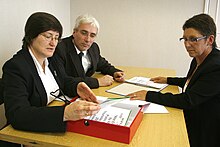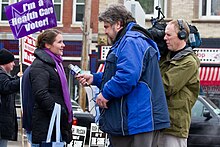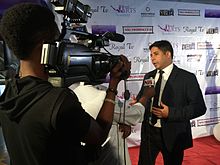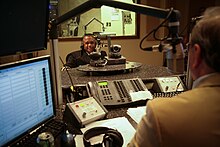| Revision as of 01:38, 13 September 2006 edit216.239.38.136 (talk) →Police← Previous edit | Latest revision as of 22:34, 1 January 2025 edit undoDrchriswilliams (talk | contribs)Autopatrolled, Extended confirmed users33,599 edits Undid revision 1266715521 by 2A00:23C8:D639:6D01:B2CF:CBFF:FEED:C03A (talk) reverted nonconstructive editTag: Undo | ||
| Line 1: | Line 1: | ||
| {{short description|Structured series of questions and answers}} | |||
| :''For the magazine, see ].'' | |||
| {{Other uses|Interview (disambiguation)}} | |||
| :''For the Italian film, see ].'' | |||
| {{Research}} | |||
| ] | |||
| ] An '''interview''' is a conversation between two or more people (The interviewer and the interviewee) where ]s are asked by the interviewer to obtain information from the interviewee. Interviews can be divided into two rough types, interviews of assessment and interviews for information. | |||
| ] | |||
| ] | |||
| ] with a member of the public]] | |||
| ] | |||
| An '''interview''' is a structured ] where one participant asks questions, and the other provides answers.<ref name=twsMerriam>Merriam Webster Dictionary, , Dictionary definition, Retrieved February 16, 2016</ref> In common parlance, the word "interview" refers to a one-on-one conversation between an ''interviewer'' and an ''interviewee''. The interviewer asks questions to which the interviewee responds, usually providing information. That information may be used or provided to other audiences immediately or later. This feature is common to many types of interviews – a job interview or interview with a witness to an event may have no other audience present at the time, but the answers will be later provided to others in the employment or investigative process. An interview may also transfer information in both directions. | |||
| Interviews usually take place face-to-face, in person, but the parties may instead be separated geographically, as in ] or ]s. Interviews almost always involve a spoken conversation between two or more parties, but can also happen between two persons who type their questions and answers. | |||
| ==Assessment== | |||
| The most common type of interview for assessment is a ] between an ] and an applicant. The goal of such an interview is to assess a potential employee to see if he/she has the social skills and intelligence suitable for the workplace. Similar interviews are also used for ], allotment of grants, and other areas. | |||
| Interviews can be unstructured, free-wheeling, and open-ended conversations without a predetermined plan or prearranged questions.<ref>{{cite book|url=https://books.google.com/books?id=3OdBAAAAIAAJ&q=Non-directive+counselling+as+an+effective+technique|title=Frontier Thinking in Guidance|last1=Rogers|first1=Carl R.|date=1945|publisher=Science research associates|location=University of California|pages=105–112|access-date=March 18, 2015}}</ref> One form of unstructured interview is a focused interview in which the interviewer consciously and consistently guides the conversation so that the interviewee's responses do not stray from the main research topic or idea.<ref name="Jamshed 87–88">{{Cite journal|last=Jamshed|first=Shazia|date=September 2014|title=Qualitative research method-interviewing and observation|journal=Journal of Basic and Clinical Pharmacy|volume=5|issue=4|pages=87–88|doi=10.4103/0976-0105.141942|issn=0976-0105|pmc=4194943|pmid=25316987 |doi-access=free }}</ref> Interviews can also be highly ] conversations in which specific questions occur in a specified order.<ref> {{ISBN|978-0-7619-2542-2}}</ref> They can follow diverse formats; for example, in a ], a respondent's answers typically guide subsequent interviews, with the object being to explore a respondent's ] ].<ref>2009, Uxmatters, </ref><ref>{{cite web |title=15 Tips on How to Nail a Face-to-Face Interview |url=https://blog.pluralsight.com/15-tips-on-how-to-nail-a-face-to-face-interview |website=blog.pluralsight.com |access-date=2015-11-05 |archive-date=2015-10-11 |archive-url=https://web.archive.org/web/20151011095130/http://blog.pluralsight.com/15-tips-on-how-to-nail-a-face-to-face-interview |url-status=dead }}</ref> Typically the interviewer has some way of recording the information that is gleaned from the interviewee, often by keeping notes with a pencil and paper, or with a ] or ] recorder. | |||
| In most developed countries, rules and regulations govern what can be asked in these interviews. Highly personal questions and those unrelated to the job at hand are forbidden, as are questions which invite discrimination. However some interviewers tend to ask such questions in order to see how the interviewee reacts and if (s)he is able to elegantly avert the question. | |||
| The traditionally two-person interview format, sometimes called a one-on-one interview, permits direct questions and follow-ups, which enables an interviewer to better gauge the accuracy and relevance of responses. It is a flexible arrangement in the sense that subsequent questions can be tailored to clarify earlier answers. Further, it eliminates possible distortion due to other parties being present. Interviews have taken on an even more significant role, offering opportunities to showcase not just expertise, but adaptability and strategic thinking. | |||
| Such interviews can be brief fifteen-minute affairs or they can stretch for many hours even over a series of days. McMaster University and other institutions have begun admitting medical students based upon Multiple Mini-Interviews. Multiple Mini-Interviews involve having each candidate rotate through a series of 10-12 short "stations." Each station requires the candidate to perform a task. A score is assigned by an observer to each performance and the total score determines the standing of the candidate. Research on the Multiple Mini-Interview has suggested it is more reliable than traditional panel-based interviews as interviewer biases and unusual performances on the part of the candidate get diluted among a larger sample of behaviours. | |||
| == Contexts == | |||
| Another important type of interview is the psychological one that can be divided into three forms: structured, semi-structured and non-structured. | |||
| ] | |||
| Interviews can happen in a wide variety of contexts: | |||
| * '''Employment'''. A ] is a formal consultation for evaluating the qualifications of the interviewee for a specific position.<ref name="Dipboye et al">Dipboye, R. L., Macan, T., & Shahani-Denning, C. (2012). The selection interview from the interviewer and applicant perspectives: Can't have one without the other. In N. Schmitt (Ed.), The Oxford handbook of personnel assessment and selection (pp. 323–352). New York City: Oxford University.</ref><ref name="Chron">{{cite web|url=http://work.chron.com/value-importance-job-interview-1660.html |title=The Value or Importance of a Job Interview |publisher=] |access-date=2014-01-17}}</ref> One type of job interview is a ] in which the applicant is presented with a question or task or challenge, and asked to resolve the situation.<ref>Maggie Lu, ''The Harvard Business School Guide to Careers in Management Consulting'', 2002, page 21, {{ISBN|978-1-57851-581-3}}</ref> Candidates may be treated to a ] as a training exercise to prepare the respondent to handle questions in the subsequent 'real' interview. A series of interviews may be arranged, with the first interview sometimes being a short ''screening interview'', followed by more in-depth interviews, usually by company personnel who can ultimately hire the applicant. Technology has enabled new possibilities for interviewing; for example, ] has enabled interviewing applicants from afar which is becoming increasingly popular. | |||
| * '''Psychology'''. Psychologists use a variety of interviewing methods and techniques to try to understand and help their patients. In a ], a psychiatrist or psychologist or nurse asks a battery of questions to complete what is called a ]. Sometimes two people are interviewed by an interviewer, with one format being called ]s.<ref name="P-G-2015">{{cite journal|last1=Polak|first1=L|last2=Green|first2=J|year=2015|title=Using Joint Interviews to Add Analytic Value|url=https://kclpure.kcl.ac.uk/portal/en/publications/using-joint-interviews-to-add-analytic-value(dfe3fe1b-df7e-43f9-b6a1-6ed14f8300f1).html|journal=]|volume=26|issue=12|pages=1638–48|doi=10.1177/1049732315580103|pmid=25850721|s2cid=4442342}}</ref> Criminologists and detectives sometimes use ]s on eyewitnesses and victims to try to ascertain what can be recalled specifically from a crime scene, hopefully before the specific memories begin to fade in the mind.<ref name="Memon, Cronin, Eaves, Bull">Memon, A., Cronin, O., Eaves, R., Bull, R. (1995). An empirical test of mnemonic components of the cognitive interview. In G. Davies, S. Lloyd-Bostock, M. McMurran, C. Wilson (Eds.), Psychology, Law, and Criminal Justice (pp. 135–145). Berlin: Walter de Gruyer.</ref><ref>Rand Corporation. (1975) The criminal investigation process (Vol. 1–3). Rand Corporation Technical Report R-1776-DOJ, R-1777-DOJ, Santa Monica, CA</ref> | |||
| * '''Marketing and Academic'''. In ] and ], interviews are used in a wide variety of ways as a method to do extensive personality tests. ] are the most used form of data collection in ].<ref name="Jamshed 87–88" /> Interviews are used in marketing research as a tool that a firm may utilize to gain an understanding of how consumers think, or as a tool in the form of ] (or cognitive pretesting) for improving questionnaire design.<ref name=":4">{{Cite book |last=Willis |first=Gordon |title=Cognitive interviewing: A tool for improving questionnaire design |publisher=Sage |year=2005 |isbn=9780761928041 |pages=146}}</ref><ref>{{Cite journal |last1=Park |first1=Hyunjoo |last2=Sha |first2=M. Mandy |date=2014-11-02 |title=Investigating validity and effectiveness of cognitive interviewing as a pretesting method for non-English questionnaires: Findings from Korean cognitive interviews |url=http://www.tandfonline.com/doi/abs/10.1080/13645579.2013.823002 |journal=International Journal of Social Research Methodology |language=en |volume=17 |issue=6 |pages=643–658 |doi=10.1080/13645579.2013.823002 |s2cid=144039294 |issn=1364-5579}}</ref> Consumer research firms sometimes use ] to randomly dial phone numbers to conduct highly structured telephone interviews, with scripted questions and responses entered directly into the computer.<ref name="uslabor">{{cite web|url=http://www.bls.gov/bls/glossary.htm|title=BLS Information |date=February 28, 2008|work=Glossary|publisher=U.S. Bureau of Labor Statistics Division of Information Services |access-date=2009-05-05}}</ref> | |||
| * '''Journalism and other media'''. Typically, reporters covering a story in ] conduct ] over the phone and in person to gain information for subsequent publication. Reporters also interview government officials and political candidates for broadcast.<ref>{{Cite book|url=https://books.google.com/books?id=OQusAgAAQBAJ&q=news+interview+invented&pg=PA1|title=Interviewing for Radio|last=Beaman|first=Jim|date=2011-04-14|publisher=Routledge|isbn=978-1-136-85007-3|language=en}}</ref> In a ], a radio or television host interviews one or more people, with the topic usually chosen by the host, sometimes for ], sometimes for informational purposes. Such interviews are often recorded. | |||
| * '''Other situations'''. Sometimes college representatives or alumni conduct ]s with prospective students as a way of assessing a student's suitability while offering the student a chance to learn more about a college.<ref name="twsBostonGlobe4" /> Some services specialize in coaching people for interviews.<ref name="twsBostonGlobe4">{{cite web | |||
| | author= Sanjay Salomon | |||
| | date= January 30, 2015 | |||
| | publisher= Boston Globe | |||
| | url= http://www.boston.com/jobs/news/2015/01/30/can-failure-resume-help-you-succeed/uTBdq9A7LfXXF7vVOlG9oM/story.html | |||
| | title= Can a Failure Resume Help You Succeed? | |||
| | access-date= January 31, 2016 | |||
| }} | |||
| </ref> Embassy officials may conduct interviews with applicants for student visas before approving their visa applications. Interviewing in legal contexts is often called ]. ] is another kind of interview. | |||
| == |
==Blind interview== | ||
| In a '''blind interview''' the identity of the interviewee is concealed to reduce interviewer bias. Blind interviews are sometimes used in the software industry and are standard in ]. Blind interviews have been shown in some cases to increase the hiring of minorities and women.<ref>{{cite web |last1=Miller |first1=Claire Cain |title=Is Blind Hiring the Best Hiring? |url=https://www.nytimes.com/2016/02/28/magazine/is-blind-hiring-the-best-hiring.html |website=The New York Times |date=25 February 2016}}</ref> | |||
| The second class of interviews are those seeking to gather information about a subject. These types of interviews are central to the practices of ] and ]. Such interviews are also important to any non-fiction writer or researcher. In general the quotes and information gathered in these interviews are used in a publication or edited for broadcast. | |||
| == Interviewer bias == | |||
| Such interviews only occur because the subjects have some interest in being interviewed. There are four main reasons why subjects agree to be interviewed: | |||
| The relationship between the interviewer and interviewee in research settings can have both positive and negative consequences.<ref name=":0">{{Cite book|last=Watson, Lucas|title=Qualitative research design : an interactive approach|year=2018|isbn=978-1-68469-560-7|location=New Orleans|oclc=1124999541}}</ref> Their relationship can bring deeper understanding of the information being collected, however this creates a risk that the interviewer will be unable to be unbiased in their collection and interpretation of information.<ref name=":0" /> Bias can be created from the interviewer's perception of the interviewee, or the interviewee's perception of the interviewer.<ref name=":0" /> Additionally, a researcher can bring biases to the table based on the researcher's mental state, their preparedness for conducting the research, and the researcher conducting inappropriate interviews.<ref>{{Cite journal|last=Chenail|first=Ronald|date=2011-01-01|title=Interviewing the Investigator: Strategies for Addressing Instrumentation and Researcher Bias Concerns in Qualitative Research|url=https://nsuworks.nova.edu/tqr/vol16/iss1/16|journal=The Qualitative Report|volume=16|issue=1|pages=255–262|issn=1052-0147}}</ref> Interviewers can use various practices known in ] to mitigate interviewer bias. These practices include ], ], and ]. Each of these practices allows the interviewer, or researcher, the opportunity to use their bias to enhance their work by gaining a deeper understanding of the problem they are studying.<ref>{{Cite journal|last1=Roulston|first1=Kathryn|last2=Shelton|first2=Stephanie Anne|date=2015-02-17|title=Reconceptualizing Bias in Teaching Qualitative Research Methods|journal=Qualitative Inquiry|language=en-US|volume=21|issue=4|pages=332–342|doi=10.1177/1077800414563803|s2cid=143839439|issn=1077-8004}}</ref> | |||
| *] - The desire to be on television and to have one's opinions aired is a strong one to many. Many people enjoy talking about themselves and their lives. | |||
| *] - Politicians and celebrities are dependent on publicity for their success and an interview is free advertising. As such many subjects insist upon prominent mentions of their latest book or movie in the interview. Such promotional interviews are frequently required by contracts. | |||
| *] - The issue of whether reporters should pay for interviews is a controversial one. ]s and experts are almost always paid, and this is often an important source of income to them. Most media outlets have rules against paying eyewitnesses for interviews, in part because this only encourages the fabrication of fraudulent stories in the hopes of being paid. A major exception to this are some ]s, especially British tabloids. Other media outlets often wine and dine sought after subjects and give them other such perks. | |||
| *Helpfulness - many subjects agree to an interview simply to aid the reporter. This is true of most eyewitnesses and help explain why many famous individuals agree to grant interviews for items such as school papers. | |||
| == See also == | |||
| Even after an interview has been granted the subject normally imposes conditions. Almost all interviews have a time limit. The greater the fame and importance of a subject the more limitations they demand. These includes subject matters that are off limits, a veto over the final piece, or even a full list of questions provided in advance. Some politicians, notably ] (Germany), have avoided giving interviews to the press, whereas many others consider this a necessary aspect of political campaigning. | |||
| * ] interview | |||
| *In research | |||
| ** ] | |||
| ** ] | |||
| ** ] | |||
| ** ] | |||
| ** ] interview | |||
| ** ] interview | |||
| ** ] | |||
| ** ] | |||
| ** ] | |||
| *In journalism and media | |||
| ** ] | |||
| ** ] | |||
| ** ] or vox pop | |||
| *In other contexts | |||
| ** ] | |||
| ** ], between a librarian and a library user | |||
| ==References== | |||
| There are several other rules to interviews. If a subject declares that what they say is "]" a reporter is not supposed to use such information. If material is "]" the material can be used but its source cannot be mentioned, if it is "deep background" then the information cannot be used on its own, and can only confirm information already obtained from another source. A subject may also declare that their comments should have no "attribution." In such cases the name of the subject cannot be mentioned, but they should simply be referred to as "a source in ...". | |||
| {{Reflist}} | |||
| {{Authority control}} | |||
| These rules are unwritten and in the past reporters have broken them. However if a journalist published material that was off the record they are unlikely to be able to use that source again. They are known as a "burnt source." Moreover news of such betrayals spreads and a reporter may have trouble with other sources. | |||
| ] | |||
| The tone of an interviewer is also important. Tough interviewers that are honest and forthrightly pose important and difficult questions are appealing to audiences, but not to subjects. An interviewer that develops a reputation for such aggressiveness may soon find it difficult to convince subjects to sit for an interview. A subject that is offended during an interview may put an early halt to the discussion. Politicians, celebrities, and experts on certain subjects are frequently interviewed. Sometimes interviews are ended early (usually by the interviewee); one famous example is the interview of ] by ] in the film '']''. Well known ] can often only get interviews under false pretenses. Conversely an interviewer that only asks "soft" questions will lose the respect of audiences and colleagues. | |||
| ] | |||
| The ideal interview is considered to be a face to face one. Most newspapers order reporters to specifically mention that an interview was conducted by ] or ]. | |||
| ==Scholarly research== | |||
| A research interview is a structured social interaction between a researcher and a subject who is identified as a potential source of information, in which the interviewer initiates and controls the exchange to obtain quantifiable and comparable information relevant to an emerging or previously stated hypothesis. | |||
| ==Police== | |||
| In a ], an interview is called an interrogation. An interrogation is a conversation between police and crime suspects to get possible clues to the investigation. To avoid fabrication by police in the UK, interrogations are audio recorded whereas in many other countries such as Japan, they are not. | |||
| ==Famous interviews== | |||
| *] - ] interviewing ] only days before ] | |||
| *] - a number of very influential pop-cultural interviews in the 70's | |||
| *] - canonically challenging method of job interview | |||
| *] - An interview with ], later created into a documentary | |||
| ] | |||
| ] | |||
| ] | |||
| ] | |||
| ] | |||
| ] | |||
| ] | |||
| ] | |||
| ] | |||
| ] | |||
| ] | |||
Latest revision as of 22:34, 1 January 2025
Structured series of questions and answers For other uses, see Interview (disambiguation).| Part of a series on |
| Research |
|---|
 |
| Research design |
| Research strategy |
| Philosophical schools |
| Methodology |
| Methods |
| Tools and software |
| Philosophy portal |





An interview is a structured conversation where one participant asks questions, and the other provides answers. In common parlance, the word "interview" refers to a one-on-one conversation between an interviewer and an interviewee. The interviewer asks questions to which the interviewee responds, usually providing information. That information may be used or provided to other audiences immediately or later. This feature is common to many types of interviews – a job interview or interview with a witness to an event may have no other audience present at the time, but the answers will be later provided to others in the employment or investigative process. An interview may also transfer information in both directions.
Interviews usually take place face-to-face, in person, but the parties may instead be separated geographically, as in videoconferencing or telephone interviews. Interviews almost always involve a spoken conversation between two or more parties, but can also happen between two persons who type their questions and answers.
Interviews can be unstructured, free-wheeling, and open-ended conversations without a predetermined plan or prearranged questions. One form of unstructured interview is a focused interview in which the interviewer consciously and consistently guides the conversation so that the interviewee's responses do not stray from the main research topic or idea. Interviews can also be highly structured conversations in which specific questions occur in a specified order. They can follow diverse formats; for example, in a ladder interview, a respondent's answers typically guide subsequent interviews, with the object being to explore a respondent's subconscious motives. Typically the interviewer has some way of recording the information that is gleaned from the interviewee, often by keeping notes with a pencil and paper, or with a video or audio recorder.
The traditionally two-person interview format, sometimes called a one-on-one interview, permits direct questions and follow-ups, which enables an interviewer to better gauge the accuracy and relevance of responses. It is a flexible arrangement in the sense that subsequent questions can be tailored to clarify earlier answers. Further, it eliminates possible distortion due to other parties being present. Interviews have taken on an even more significant role, offering opportunities to showcase not just expertise, but adaptability and strategic thinking.
Contexts

Interviews can happen in a wide variety of contexts:
- Employment. A job interview is a formal consultation for evaluating the qualifications of the interviewee for a specific position. One type of job interview is a case interview in which the applicant is presented with a question or task or challenge, and asked to resolve the situation. Candidates may be treated to a mock interview as a training exercise to prepare the respondent to handle questions in the subsequent 'real' interview. A series of interviews may be arranged, with the first interview sometimes being a short screening interview, followed by more in-depth interviews, usually by company personnel who can ultimately hire the applicant. Technology has enabled new possibilities for interviewing; for example, video telephony has enabled interviewing applicants from afar which is becoming increasingly popular.
- Psychology. Psychologists use a variety of interviewing methods and techniques to try to understand and help their patients. In a psychiatric interview, a psychiatrist or psychologist or nurse asks a battery of questions to complete what is called a psychiatric assessment. Sometimes two people are interviewed by an interviewer, with one format being called couple interviews. Criminologists and detectives sometimes use cognitive interviews on eyewitnesses and victims to try to ascertain what can be recalled specifically from a crime scene, hopefully before the specific memories begin to fade in the mind.
- Marketing and Academic. In marketing research and academic research, interviews are used in a wide variety of ways as a method to do extensive personality tests. Interviews are the most used form of data collection in qualitative research. Interviews are used in marketing research as a tool that a firm may utilize to gain an understanding of how consumers think, or as a tool in the form of cognitive interviewing (or cognitive pretesting) for improving questionnaire design. Consumer research firms sometimes use computer-assisted telephone interviewing to randomly dial phone numbers to conduct highly structured telephone interviews, with scripted questions and responses entered directly into the computer.
- Journalism and other media. Typically, reporters covering a story in journalism conduct interviews over the phone and in person to gain information for subsequent publication. Reporters also interview government officials and political candidates for broadcast. In a talk show, a radio or television host interviews one or more people, with the topic usually chosen by the host, sometimes for entertainment, sometimes for informational purposes. Such interviews are often recorded.
- Other situations. Sometimes college representatives or alumni conduct college interviews with prospective students as a way of assessing a student's suitability while offering the student a chance to learn more about a college. Some services specialize in coaching people for interviews. Embassy officials may conduct interviews with applicants for student visas before approving their visa applications. Interviewing in legal contexts is often called interrogation. Debriefing is another kind of interview.
Blind interview
In a blind interview the identity of the interviewee is concealed to reduce interviewer bias. Blind interviews are sometimes used in the software industry and are standard in orchestral auditions. Blind interviews have been shown in some cases to increase the hiring of minorities and women.
Interviewer bias
The relationship between the interviewer and interviewee in research settings can have both positive and negative consequences. Their relationship can bring deeper understanding of the information being collected, however this creates a risk that the interviewer will be unable to be unbiased in their collection and interpretation of information. Bias can be created from the interviewer's perception of the interviewee, or the interviewee's perception of the interviewer. Additionally, a researcher can bring biases to the table based on the researcher's mental state, their preparedness for conducting the research, and the researcher conducting inappropriate interviews. Interviewers can use various practices known in qualitative research to mitigate interviewer bias. These practices include subjectivity, objectivity, and reflexivity. Each of these practices allows the interviewer, or researcher, the opportunity to use their bias to enhance their work by gaining a deeper understanding of the problem they are studying.
See also
- Repertory grid interview
- In research
- In journalism and media
- Interview (journalism)
- Talk show
- Vox populi or vox pop
- In other contexts
- College interview
- Reference interview, between a librarian and a library user
References
- Merriam Webster Dictionary, Interview, Dictionary definition, Retrieved February 16, 2016
- Rogers, Carl R. (1945). Frontier Thinking in Guidance. University of California: Science research associates. pp. 105–112. Retrieved March 18, 2015.
- ^ Jamshed, Shazia (September 2014). "Qualitative research method-interviewing and observation". Journal of Basic and Clinical Pharmacy. 5 (4): 87–88. doi:10.4103/0976-0105.141942. ISSN 0976-0105. PMC 4194943. PMID 25316987.
- Kvale & Brinkman. 2008. InterViews, 2nd Edition. Thousand Oaks: SAGE. ISBN 978-0-7619-2542-2
- 2009, Uxmatters, Laddering: A research interview technique for uncovering core values
- "15 Tips on How to Nail a Face-to-Face Interview". blog.pluralsight.com. Archived from the original on 2015-10-11. Retrieved 2015-11-05.
- Dipboye, R. L., Macan, T., & Shahani-Denning, C. (2012). The selection interview from the interviewer and applicant perspectives: Can't have one without the other. In N. Schmitt (Ed.), The Oxford handbook of personnel assessment and selection (pp. 323–352). New York City: Oxford University.
- "The Value or Importance of a Job Interview". Houston Chronicle. Retrieved 2014-01-17.
- Maggie Lu, The Harvard Business School Guide to Careers in Management Consulting, 2002, page 21, ISBN 978-1-57851-581-3
- Polak, L; Green, J (2015). "Using Joint Interviews to Add Analytic Value". Qualitative Health Research. 26 (12): 1638–48. doi:10.1177/1049732315580103. PMID 25850721. S2CID 4442342.
- Memon, A., Cronin, O., Eaves, R., Bull, R. (1995). An empirical test of mnemonic components of the cognitive interview. In G. Davies, S. Lloyd-Bostock, M. McMurran, C. Wilson (Eds.), Psychology, Law, and Criminal Justice (pp. 135–145). Berlin: Walter de Gruyer.
- Rand Corporation. (1975) The criminal investigation process (Vol. 1–3). Rand Corporation Technical Report R-1776-DOJ, R-1777-DOJ, Santa Monica, CA
- Willis, Gordon (2005). Cognitive interviewing: A tool for improving questionnaire design. Sage. p. 146. ISBN 9780761928041.
- Park, Hyunjoo; Sha, M. Mandy (2014-11-02). "Investigating validity and effectiveness of cognitive interviewing as a pretesting method for non-English questionnaires: Findings from Korean cognitive interviews". International Journal of Social Research Methodology. 17 (6): 643–658. doi:10.1080/13645579.2013.823002. ISSN 1364-5579. S2CID 144039294.
- "BLS Information". Glossary. U.S. Bureau of Labor Statistics Division of Information Services. February 28, 2008. Retrieved 2009-05-05.
- Beaman, Jim (2011-04-14). Interviewing for Radio. Routledge. ISBN 978-1-136-85007-3.
- ^ Sanjay Salomon (January 30, 2015). "Can a Failure Resume Help You Succeed?". Boston Globe. Retrieved January 31, 2016.
- Miller, Claire Cain (25 February 2016). "Is Blind Hiring the Best Hiring?". The New York Times.
- ^ Watson, Lucas (2018). Qualitative research design : an interactive approach. New Orleans. ISBN 978-1-68469-560-7. OCLC 1124999541.
{{cite book}}: CS1 maint: location missing publisher (link) - Chenail, Ronald (2011-01-01). "Interviewing the Investigator: Strategies for Addressing Instrumentation and Researcher Bias Concerns in Qualitative Research". The Qualitative Report. 16 (1): 255–262. ISSN 1052-0147.
- Roulston, Kathryn; Shelton, Stephanie Anne (2015-02-17). "Reconceptualizing Bias in Teaching Qualitative Research Methods". Qualitative Inquiry. 21 (4): 332–342. doi:10.1177/1077800414563803. ISSN 1077-8004. S2CID 143839439.